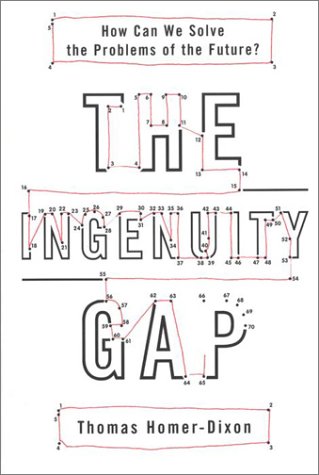"The most persuasive forecast of the 21st century I have seen." --E.O. Wilson, author of The Unity of Knowledge and twice winner of a Pulitzer prize.In The Ingenuity Gap , Thomas Homer-Dixon, "global guru" (the Toronto Star ), "genuine academic celebrity" ( Saturday Night ) and "one of Canada's most talked about and controversial scholars" ( Maclean's ) is our world becoming too complex, too fast-paced to manage? The challenges facing us - ranging from international financial crises and global climate change to pandemics of tuberculosis and AIDS- converge, intertwine, and remain largely beyond our ken. Most of suspect the "experts don't really know what's going on; that as a species we've released forces that are neither managed nor manageable. We are fast approaching a time when we may no longer be able to control a world that increasingly exceeds our grasp. This is "the ingenuity gap" - the term coined by Thomas Homer-Dixon, political scientist and advisor to the White House - the critical gap between our need for practical, innovative ideas to solve complex problems and our actual supply of those ideas.
Through gripping narrative stories and incidents that exemplify his arguments, he takes us on a world tour that begins with a heartstopping description of the tragic crash of United Airlines Flight 232 from Denver to Chicago and includes Las Vegas inits desert, a wilderness beach in British Columbia, and his solitary search for a little girl in Patna, India. He shows how, in our complex world, while poor countries are particularly vulnerable to ingenuity gaps, our own rich countries are not immune, and we are caught dangerously between a soaring requirement for ingenuity and an increasingly uncertain supply. When the gap widens, political disintegration and violent upheaval can result, reaching into our own economies and daily lives in subtle ways. In compelling, lucid, prose, he makes real the problems we face and suggests how we might overcome them - in our own lives, our thing, our business and our societies.
As the world becomes more complex, so do its problems--and the solutions to these problems become tougher to grasp, writes University of Toronto professor Thomas Homer-Dixon in
The Ingenuity Gap. "As we strive to maintain or increase our prosperity and improve the quality of our lives, we must make far more sophisticated decisions, and in less time, than ever before," he writes. Is the day coming in which our ingenuity can't keep up? Homer-Dixon fears that it is: "the hour is late," and we're blindly "careening into the future." What we face, he says, is a "very real chasm that sometimes looms between our ever more difficult problems and our lagging ability to solve them." There are moments when Homer-Dixon comes close to sounding like a modern-day Malthus, with his never-ending worries about population growth, the environment, the strength of international financial institutions, civil wars, and so on. Yet parts of this book are downright fascinating; at its best,
The Ingenuity Gap reads like one of Malcolm Gladwell's stories for
The New Yorker (or his book
The Tipping Point).
Homer-Dixon is very good when he tackles particular problems, and his interests are wide-ranging, moving from the psychology of an airplane cockpit during a crisis to the depletion of the world's fisheries to differences between the minds of Neanderthals and Homo sapiens. He also dredges up fine details. Did you know that "the largest human-made structure on the planet is not an Egyptian pyramid or a hydroelectric dam but the Staten Island Fresh Kills landfill near New York City, which has a depth of one hundred meters and an area of nine square kilometers"? There's plenty to argue with on these pages, and some readers will find Homer-Dixon's tendency to write in the first person a bit self-indulgent. Yet fans of big-think books like Jared Diamond's Guns, Germs, and Steel, David Landes's The Wealth and Poverty of Nations, and Robert Wright's The Moral Animal will find The Ingenuity Gap riveting. --John J. Miller
